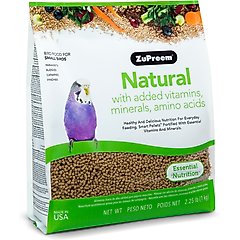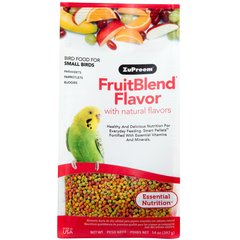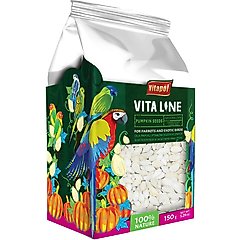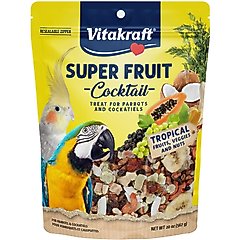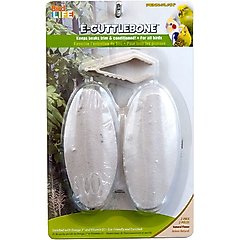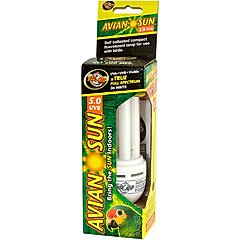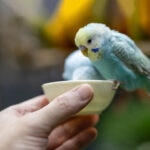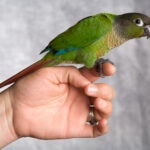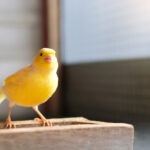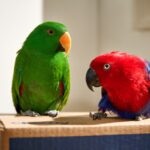What Do Parakeets Eat?
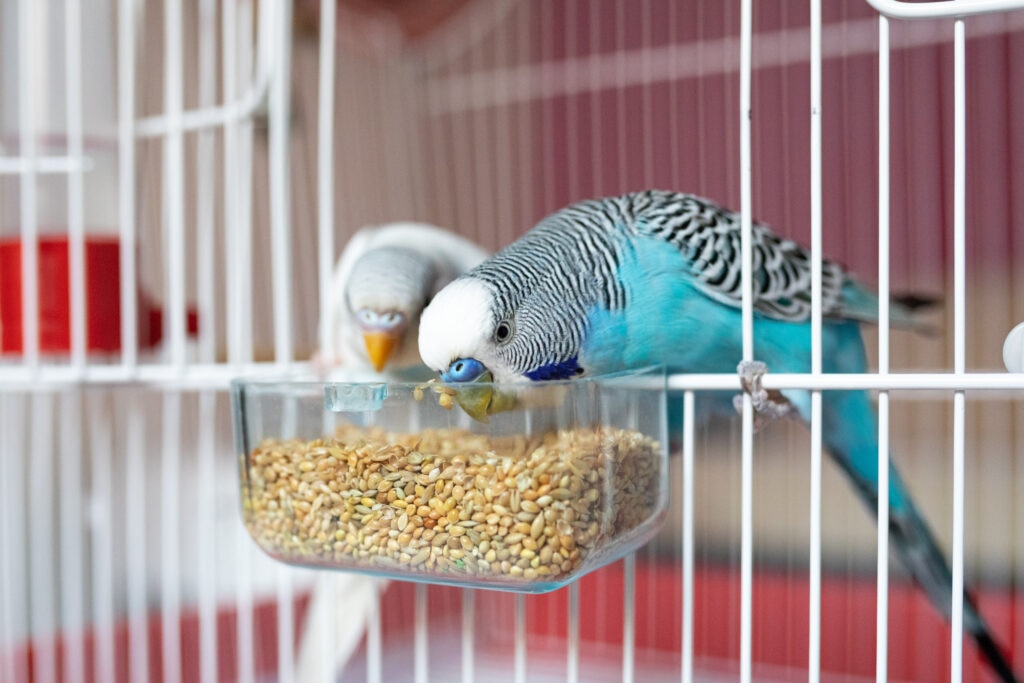
Photo by Dusan Ilic/iStock/Getty Images Plus
Have you ever considered adding a parakeet pal to your family? Before you do, it’s important to understand what pet parakeets eat and—just as importantly—what they don’t eat.
So what do parakeets eat? Discover everything you need to know about parakeet diets, from the main course to nutritious treats.
Key Takeaways
- Pet parakeets need a formulated diet to get the nutrients they need.
- Parakeets can also eat fruits and vegetables fed in small amounts and prepared properly.
- Avoid feeding your parakeet strictly seed diets as they do not offer the nutrition pet birds need.
What Do Parakeets Eat?
Native to tropical and subtropical regions around the world, plus the drier main continent of Australia, parakeets eat a varied diet in the wild. Depending on location and season, wild parakeets eat:
- Vegetables
- Fruits
- Nuts
- Insects and insect larvae
Wild birds, however, have far different nutritional needs than pet birds, explains August Abbott, PhD, a certified avian specialist through Pet Advocacy Network, a member of the International Association of Animal Behavior Consultants, and the founder of The Broken Birds Sanctuary in Grass Valley, California.
Pet parakeets should be fed high-quality pelleted parakeet food, supplemented by the occasional treat.
Bird-seed only diets, however, are particularly problematic for pet birds—even if that’s what you’re accustomed to putting in your backyard bird feeder.
“Outdoor birds are in nearly constant motion flying, sometimes miles on end in a day, looking for various forms of food,” says Abbott. “Our bird feeders are like gas stations for them—seeds give a burst of energy that fuels them on their way to the next food source. Indoor birds, even if free-flighted in our homes, are not getting in the calorie burn that outdoor birds are.”
Therefore, pet birds that eat only seed may become overweight and develop nutritional deficiencies.
What To Feed Pet Parakeets
So what should you feed your pet parakeet? It’s a good question. Many people—including those with pet parakeets—aren’t familiar with the nutritional needs of our feathered friends.
“One of the biggest mistakes that we see when it comes to caring for parakeets is an improper diet,” says Susan Tyson, VMD, a veterinarian at Avian & Exotic Philly Vet Medical Surgical Clinic in Philadelphia.
Like cats and dogs, pet parakeets’ primary source of nutrition should be a formulated diet that includes all of their necessary nutrients. “We recommend an all-pellet diet as a healthy replacement for seeds,” says Dr. Tyson.
To add variety and enrichment, you can also give your parakeet fresh foods daily, such as cut-up veggies and fruits.
Formulated Diets
The majority of your parakeet’s calories should come from a formulated diet, which is the best food for pet birds.
“Formulated or pellet diets have real foods in them, not just filler foods that don’t actually benefit the bird,” says Abbott.
“It’s the ultimate health food,” she adds. “Overall, a bird on such a diet not only lives longer than a bird that is not, but they have fewer health problems along the way.”
Discuss with your avian vet how to convert your parakeet from a seed-only diet to a pelleted diet. Don’t switch their seed diet to pellets all at once though—transition them gradually to ensure they keep eating.
Dr. Tyson recommends ZuPreem brand bird food to her clients. A couple to consider include:
- ZuPreem Natural Daily Small Bird Food: Complete with added vitamins, minerals, and amino acids, this bird food is an all-natural option that has no artificial colors or flavors.
Recommended Product
- ZuPreem Fruitblend Daily Small Bird Food: Containing 21 essential vitamins and minerals, as well as natural fruit flavors like bananas, apples, oranges, and grapes, this bird food can help make mealtime more exciting.
Recommended Product
Seeds
While bird seed shouldn’t be a regular part of your budgie’s diet, Abbott says they can be offered occasionally as a treat and for enrichment.
“My sanctuary birds know that Sunday is treat day, and they expect those treats no matter what,” she says.
For a satisfying snack, Abbott recommends feeding ½ teaspoon of seeds once a week at most.
Seeds safe for parakeets include:
- Pumpkin seeds
- Sunflower seeds
- Flax seeds
- Hemp seeds
- Chia seeds
- Coriander seeds
- Milk thistle seeds
- Caraway seeds
Recommended Product
Fruits
A small amount of fresh fruits adds variety and important nutrients to your parakeets’ balanced diet.
Dr. Tyson recommends offering fruits high in vitamin A, which is important for keeping your parakeet healthy.
“A shortage of vitamin A often leads to reduced resistance to infections and skin problems, and may cause a dull plumage,” she says.
Fruits safe for parakeets include the following (starred fruits are rich in vitamin A):
- Bananas
- Mango*
- Apples (remove the seeds)
- Cantaloupe*
- Oranges*
- Watermelon*
- Papaya*
- Pineapple
- Grapefruit*
- Grapes*
- Berries (strawberries, blackberries, raspberries)
- Apricot*
- Kiwi
- Plums*
- Starfruit
- Pomegranate
- Lemon*
- Nectarines
Before serving, thoroughly wash the fruit to remove pesticides, then cut into small pieces, removing the seeds. Serve alone or as part of a chopped “fruit salad” for your parakeet to nibble on throughout the day.
Helpful hint: As budgies are ground feeders in the wild, try feeding them veggies and fruits in a bowl at the bottom of the cage to help entice them. Consider varying your presentation by chopping foods into smaller pieces, and introduce by mixing them with your bird’s favorite foods to perk interest.
Some popular store-bought treats for parakeets feature fruits, like the Vitakraft Fresh Super Fruit Cocktail Fruit Blend.
Recommended Product
Vegetables
Veggies are another great way to add extra vitamin A to your parakeet’s diet, and they’re lower in sugar than fruits, says Dr. Tyson.
Consider offering your parakeet the following veggies, all of which are good sources of vitamin A:
- Dark leafy greens (kale, spinach, dandelion greens)
- Carrots (roots and tops)
- Sweet potatoes
- Peppers
- Green beans
- Basil
- Broccoli
- Bok choy
- Parsley
- Cilantro
- Sugar snap peas
- Squash
- Corn
- Cauliflower
Vegetables should be thoroughly washed and served raw for the most nutritional benefit.
If your parakeet doesn’t show interest in raw veggies, try offering them lightly steamed (allow to cool first) or cut them into very small pieces.
Calcium Supplements
An essential nutrient for birds, calcium is important for building strong bones and eggshells.
In the wild, birds seek out calcium-rich foods such as animal bones and mineral-rich dirt. At home, Dr. Tyson recommends providing your parakeet with a calcium supplement such as a cuttlebone, like the Penn-Plax Bird-Life Natural E Cuttlebones Bird Supplement, and an avian sun bulb, like the Zoo Med Avian Sun Compact Fluorescent Bird Lamp, which provides UVB light.
Recommended Products
“For your birds to pull calcium from the diet, they require UVB lighting. Calcium cannot be absorbed and transformed to vitamin D without UVB light,” Dr. Tyson explains. “Don’t forget to change your UVB bulbs every six months, even if they are producing light.”
Foods To Avoid Feeding To Your Parakeet
While your parakeet may be curious about many different foods, here are some you should avoid feeding and why:
- Mushrooms: While some mushroom varieties—including grocery store favorites such as white button, shiitake, and portobello—are safe for birds, never feed wild mushrooms, which may be toxic.
- Onions: Onions contain sulfur compounds that can cause ulcers in parakeets.
- Avocados: The pit, skin, and flesh of avocado contain persin, which can be toxic to budgies.
- Tomatoes: The acidity of tomatoes can disrupt a parakeet’s digestive system.
- Chocolate: Chocolate contains theobromine and caffeine, which are toxic to parakeets.
- Crackers and breads: While an occasional treat is OK, they offer no nutritional value.
- Meats: Higher-protein and high-fat diets in parakeets can cause liver disease and cardiovascular disease.
- Uncooked beans: Uncooked beans present a choking hazard, and some varieties contain a toxin called hemagglutinin.
- Dairy: Dairy products can cause digestive issues in parakeets.
- Alcohol and caffeine: Alcohol and caffeine are toxic to parakeets. Caffeine may cause an increased heart rate, arrhythmias, hyperactivity, or cardiac arrest in birds. Alcohol affects the liver of birds and may result in liver failure.
How Much To Feed Your Parakeet
Caloric needs vary depending on the size, age, and health of your individual parakeet. Your avian vet can help tailor your parakeet’s diet to their specific parakeet species’ needs.
When feeding a pellet-based diet, Dr. Tyson advises always having food available to your pet.
“Parakeets should not be fed at specific times—we recommend encouraging grazing for enrichment and the best results for your pet,” she says. “The food should be cleaned out daily but should be left out and available for them at all times of the day.”
Each morning, provide your parakeet with new pellets and fresh veggies or fruits. Remove the veggies and fruits at the end of the day or sooner, as they can spoil and attract ants and flies.
If you have questions about your parakeet’s diet or appetite, always consult with your avian veterinarian.
How To Help Keep Your Parakeet Hydrated
Parakeets should always have access to fresh water.
They don’t tend to consume large amounts of water, “but it should always be available,” says Dr. Tyson.
Offer multiple sources of fresh water, including a large bowl your parakeet can use for bathing. Some parakeets enjoy dipping their food into water, so be sure to change the water at least once daily—or more often if it becomes messy.
Overall, parakeets can make for chirpy, charming companions! Like any other pet, it’s important to understand your parakeet’s nutritional needs and feed them a high-quality diet to ensure they live their happiest, healthiest life.
FAQs About Parakeet Diet
What should I feed my parakeets?
Parakeets should primarily be fed a formulated pellet diet, which provides all your bird’s essential nutrients. Fresh fruits and vegetables can also be offered to add variety and vitamin A. Seed mix should be a rare treat.
Can parakeets eat bread?
Bread is not toxic to parakeets, but it offers little nutritional value. If your bird likes bread, it can be offered occasionally as a treat in small amounts. Before feeding your parakeet bread, ensure that it’s not moldy.
What fruit can parakeets not eat?
While parakeets can safely enjoy many fruits, they cannot eat avocados, which contain persin, and tomatoes, which are too acidic for their digestive systems. Dried fruits, such as dates and raisins, are calorically dense and should also be avoided.
